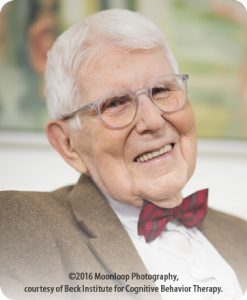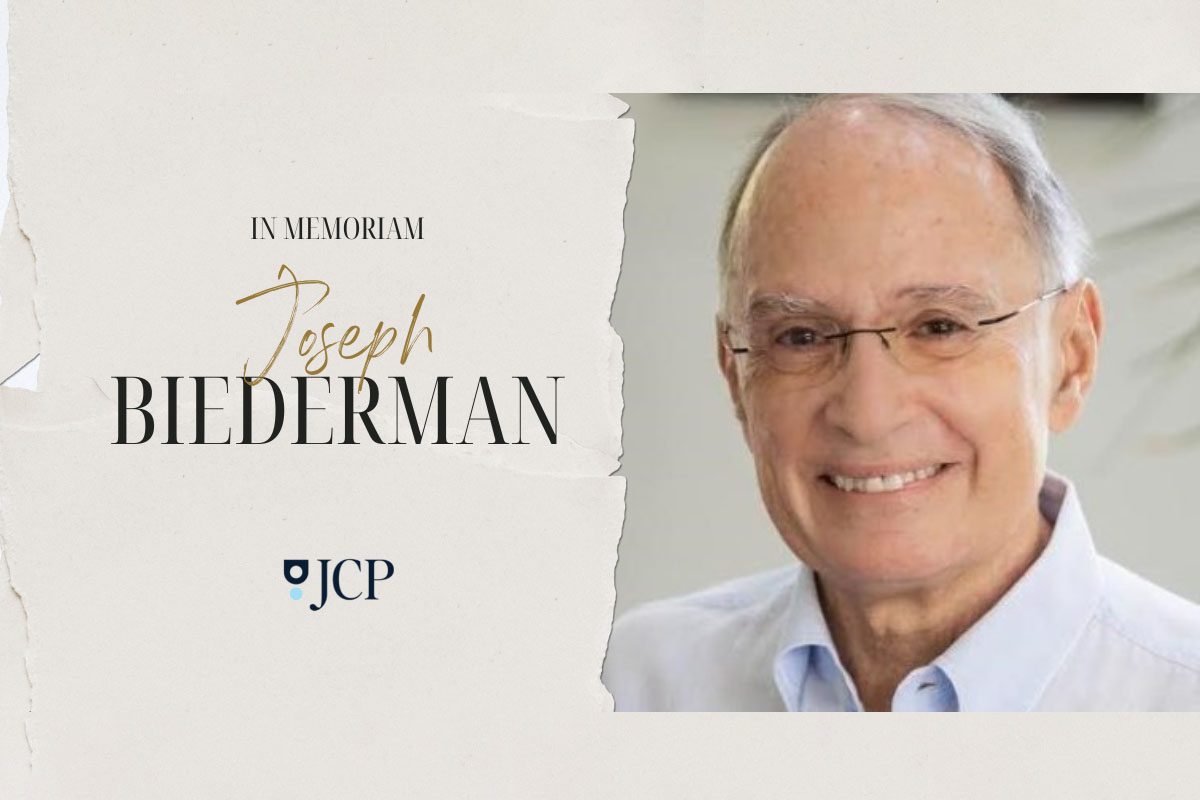J Clin Psychiatry 2022;83(1):20f14370
To share: https://doi.org/10.4088/JCP.20f14370
© Copyright 2022 Physicians Postgraduate Press, Inc.

One of the world’s legendary psychiatrists, Aaron Temkin Beck, MD, died on November 1, 2021; he was 100 years old. At the time of his death, Dr Beck had been Professor Emeritus in Psychiatry at the University of Pennsylvania’s Perelman School of Medicine for almost 3 decades and was the President Emeritus of the Beck Institute for Cognitive Behavior Therapy, which he cofounded with his daughter, Judith Beck, PhD, in the 1990s.
A 1942 graduate of Brown University and a 1946 graduate of Yale Medical School, Professor Beck’s storied career in medicine began in the cauldron of the Second World War and spanned 8 decades. Although Professor Beck’s official titles might ordinarily suggest that he enjoyed a long retirement, he was professionally active until the final months of his remarkable life. Indeed, his curriculum vitae includes a number of publications written after age 95, including a 2019 solo-authored paper that reflects on his 60(!) years of experience in cognitive theory and therapy.1 It would not be surprising if several additional papers, currently in press or under review, subsequently appear posthumously.
Professor Beck is universally recognized as the founding father of Cognitive Therapy. He also is arguably the single most influential contributor to the development of the broader family of interventions that have come to be known as Cognitive Behavior Therapy (CBT). CBT is by far the best studied psychological treatment for major depressive disorder and is also considered a first-line therapy for several of the anxiety disorders. The impact that Professor Beck’s work has had on the field is underscored by his selection for the 2006 Albert Lasker Clinical Medical Research Award, the highest prize for medical professionals in the United States. The press release announcing this honor stated that his work “transformed the understanding and treatment of many psychiatric conditions, including depression, suicidal behavior, generalized anxiety, panic attacks, and eating disorders. Cognitive therapy—whose underpinnings contradicted conventional psychiatric thinking—can reverse serious mental illnesses in two or three months of weekly sessions. Beck tested the new approach in clinical studies with a degree of rigor never before applied to any ‘talk therapy’ and thus established a new standard for assessing the effectiveness of any type of psychotherapy.”2 A subsequent survey of nearly 3,000 practicing psychotherapists, summarized in the November 2007 issue of Psychotherapy Networker, ranked Professor Beck as the second most influential person in the theory and practice of psychotherapy over the preceding 25 years.3 More recently, a peer-based survey conducted by the continuing medical education giant Medscape in 2016 determined that Professor Beck was the fourth most influential person in the history of medicine.4
The story of the origins of Beck’s Cognitive Theory of depression and the development of Cognitive Therapy has been told many times but deserves a selective retelling to highlight Professor Beck’s unique ability to push the envelope and subject strongly held beliefs to empirical scrutiny. After graduating from medical school, he completed internship and residency at hospitals in his native Rhode Island, followed by a 2-year fellowship at the Austen Riggs Center in nearby Massachusetts. He then completed his service obligations at the Army hospital in Valley Forge, Pennsylvania. Of note, Dr Beck’s first 3 publications resulted from his experiences treating Veterans at the Valley Forge facility.5–7
With the start of an academic career delayed three years by military service, the 32-year-old Dr Beck joined the faculty of the University of Pennsylvania’s Department of Psychiatry in 1954. As was expected in this era, the newly minted assistant professor entered the training program of the Philadelphia Institute of the American Psychoanalytic Association, which included a personal analysis, and threw himself into his work as a clinician and educator. Dr Beck was encouraged by his department chair, Professor Kenneth Appel, to seek funding to support research that examined strategies to improve psychoanalytically informed psychotherapy. After exploring several options, Dr Beck decided to develop an inventory to help therapists quantify their clinical impressions of their patients’ unconscious conflicts. Following Freud’s dictum that dreams are the royal road to the unconscious, Dr Beck opted to develop a tool to record and quantify areas of conflict as inferred from the content of dreams. It is thought that this work was supported by an extramural research grant from the nascent National Institute of Mental Health (NIMH). Whether due to the imprecision of the measurement tool or problems inherent to the theory of unconscious conflict being expressed during dreams, Dr Beck’s research did not lead to a method to improve the specificity of psychoanalytically informed psychotherapy. Rather, his research suggested that the manifest content of the dreams of depressed and anxious people essentially paralleled their waking thoughts about themselves, their worlds, and their future.8,9 He later referred to such negatively valenced cognitions as automatic negative thoughts and coined the term cognitive triad to describe the constellation of thoughts about self/world/future so characteristic of depressed and anxious patients. With the tool intended to assess conflicts looking like a dud, Beck used his remaining grant support to develop a simple and reliable tool to quantify the severity of depressive symptoms10 and to more systematically describe the thoughts, attitudes, and beliefs of depressed people.11,12 These important contributions were shortly followed by a decision to leave academics to enter private practice, where he would have the opportunity to focus on developing a new model of shorter-term psychotherapy that dealt more directly with the thoughts, feelings, and behaviors of his patients, not their presumed conflicts. Dr Beck returned to Penn about 4 years later with the intention to formalize and test the intervention that he was beginning to call Cognitive Therapy. And, as they say, the rest is history.
As if being Father of Cognitive Therapy is not accomplishment enough, Professor Beck also made important contributions in scale development,10,13,14 dissemination of evidence-based therapies to nonacademic mental health settings,15–17 and—most recently—a recovery-based model of therapy for individuals with the most disabling form of mental illness, chronic schizophrenia.18
With respect to scale development, the scale that is now called the Beck Depression Inventory (BDI)10 rapidly became the most widely used patient-reported outcome measure for depression over the past 60 years. It is particularly noteworthy that, although the BDI has been occasionally revised and refined over the years, the self-report version of the original 1961 scale is still quite serviceable. It is likewise noteworthy that many of the scales he helped develop over the next two decades, including measures to quantify suicidal ideation13 and hopelessness,14 continue to be used in interventions research. Although this may be an obvious point, there cannot be evidence-based practices (EBPs) if there are not reliable and valid tools to measure the severity of the problem or the impact of the treatment!
One nagging concern about the EBPs is that their expert practitioners are largely based in academic centers and rarely work with patients treated in community care settings, including those supported by city, state, or federal funding. A champion of social equity well ahead of the times, Professor Beck forged a collaborative alliance with administrators of public mental health facilities to demonstrate that effective psychotherapies could be more broadly disseminated in ways that were practicable and more sustainable than heretofore thought possible. One of the research programs that he fostered, the Beck Community Initiative,15 was based on a collaboration between Penn Psychiatry and the City of Philadelphia’s Department of Health. Now directed by psychologist Torrey Creed, this project aimed to train, supervise, and monitor the quality of the care provided by the counselors and therapists working in Philadelphia’s publicly funded mental health clinics. As evidence of both the feasibility and positive impact of this project continues to emerge,15 there is growing confidence that the chasm between the care provided by highly trained expert therapists in clinical trials and the care provided in public mental health settings can be bridged for the greater benefit of patients.
A second program, now spearheaded at Penn Psychiatry by psychologist Gregory Brown, began with a study using a CBT protocol tailored to address the needs of suicidal patients seeking treatment in several urban emergency rooms.16 This approach was subsequently extended to a particularly high risk group—Veterans17—and led to development of a short, efficient intervention for suicidal patients, Safety Planning.19 In a remarkably short time, Safety Planning has become a standard of care for the acute management of suicidal patients across a wide range of settings and may well provide the core around which other interventions may be developed.20
The final two decades of Professor Beck’s extraordinary career also saw him pursue his dream to adapt CBT to be better suited to treat individuals with schizophrenia, the most severe and persistent mental disorder.18,21 At the heart of Beck’s approach to treatment of chronic schizophrenia is the focus on identifying and modifying negative, defeatist beliefs that underpin more global attributes of social withdrawal and diminished motivation and the positivist therapeutic expectation that change is possible through stepwise tailored tasks to improve engagement in behavioral activation exercises and problem solving strategies. Although it is not yet clear if recovery-oriented CBT will have the magnitude of impact for people with schizophrenia that Cognitive Therapy has had for people with depression, it is clear that the approach has infused much-needed optimism for use of psychosocial interventions with people with severe and persistent mental disorders.
Personal Reflections
Aaron T. Beck was one of my heroes for more than 45 years. I met Professor Beck for the first time, briefly, in November 1974. I had driven with some like-minded students from Dayton, Ohio, to Chicago to attend the annual meeting of the Association for Advancement of Behavior Therapy (AABT). This was my first professional congress, and I decided to attend a keynote address by Professor Beck on his approach to conceptualizing and treating depression. When I entered the auditorium that day, stoked by all of the wisdom that four years of undergraduate education could convey, I believed that behavioral formulations of depression were—at best—underdeveloped and that behavioral therapies were likely to be better suited for treatment of common anxiety disorders than moderate to severe depression. I was also on the fence about whether to attend graduate school in clinical psychology or medical school. Professor Beck’s lecture was both awesome and eye-opening with respect to the prospects for cognitive and behavioral interventions for depressed people. Seeing a psychiatrist shine so brightly at this decidedly nonmedical conference also helped shift my choice toward medical school, which was of course the gateway to psychiatry. In an uncharacteristic moment of bravado, I approached the podium area after the lecture and bashfully waited my turn to say hello. Professor Beck, who already had a shock of gray hair, was wearing a gray suit, white dress shirt, and, of course, that signature red bow tie. He patiently spoke to everyone waiting to see him. When my turn came, he looked interested and truly engaged; he reciprocated in the conversation, even asking about my research interests and future plans. Although I now know that he was only 53 (and just 6 years older than my father), his uniquely soft-spoken and kindly form of charisma seemed grandfatherly (and possibly the best grandfather that an aspiring young academic could hope to have!). Many years later, when we talked about this first meeting, Professor Beck jokingly said that we were lucky that he was not yet very famous in 1974, because he was certain that, over the years, he was no longer able to meaningfully engage with all who wanted to say hello.
Although our paths did not cross again for another decade, his first books specifically about Cognitive Therapy were published while I was in medical school, as was the paper by this group describing the results of the first controlled study comparing Cognitive Therapy with an antidepressant. A few years later as a resident at the University of Pittsburgh, I had the privilege to be supervised in Cognitive Therapy by one of Professor Beck’s “first generation” of trainees, psychologist Maria Kovacs. Over the next few years, as a fellow and junior faculty member, my chairman and mentor for many years, Professor David Kupfer, arranged to have another of Professor Beck’s trainees, Canadian psychologist Brian Shaw, teach me how to become a supervisor and trainer so that we could contribute to the next generation of cognitive therapists.
At some point during that era, I had the opportunity to watch a video of a memorable debate between Professor Beck and psychologist Albert Ellis. Ellis, who was also the father of a newer form of therapy (Rational Emotive Therapy), had taken a different path in treatment development and did not conduct research. The contrast in the interpersonal styles of these two giants was both interesting and entertaining. Ellis was also charismatic, but in a much different way. He relished in pointing out errors in people’s assumptions or conclusions and the apparent mistakes in actions or strategies that often resulted in counterproductive outcomes. Whereas Beck used Socratic questioning to patiently guide the patient to his or her own discoveries about cognitions, moods, and behaviors, Ellis’s method typically got to the point much quicker. Ellis also made liberal use of profanity and off-color aphorisms, which often provoked laughter and chortles from my fellow trainees. By contrast, Beck—though not humorless—seemed much more ministerial. Despite the “naughty boy” appeal of Albert Ellis, I continued to favor Beck’s approach with my patients, and I must confess that when I was introduced to Albert Ellis a few years later, at no time did I wish for him to be my grandfather!
In the years that followed residency, opportunities to work with and continue to learn from Professor Beck began to proliferate. We saw each other several times a year at the American Psychiatric Association meeting and AABT, as well as one memorable meeting of the Society for Psychotherapy Research in Lake Louise, Canada. On every occasion, the qualities that were so impressive and endearing during that first meeting were evident, and our connectedness grew as we began to collaborate on writing and research projects. He was always a kind, caring, and fundamentally decent man who was devoted to doing the right things to improve the care that our patients received and, as a result, improve their chances for success. I am particularly indebted to two other “Beck trainees,” psychiatrists A. John Rush and Jesse Wright, for facilitating my academic collaborations with Professor Beck, which included a book on the inpatient applications of CBT.22 Although this book didn’t sell many copies, it continues to be one of my favorites.
After joining the faculty at Penn in 2007, I enjoyed the closer geographic proximity to Professor Beck and will always cherish the memories of our lunchtime “update” meetings at his off-campus office at the Beck Institute in suburban Bala Cynwyd. He was truly interested in hearing about the state of the department at Penn Psychiatry and learning about the well-being of the slowly dwindling number of former colleagues still on the faculty. And, as always, he was eager to learn the results of our various studies of CBT as they read out over the next 12+ years.22–27 It was great to get the chance to get to know his wonderful daughter, Judy, who no doubt will continue the tradition of excellence at the Beck Institute for the next generation of trainees. He also helped to make introductions and foster opportunities to collaborate with some of the newest members of his extended professional family on the faculty at Penn Psychiatry, who will be my close colleagues during my final years at Penn Psychiatry. And, at some point before his 90th birthday, I finally became comfortable with calling him Tim (his preferred nickname).
As age took its toll, restricting Tim’s mobility and diminishing his vision and hearing, our contacts decreased in frequency and duration. During the final few years before the pandemic, I came out to Bala Cynwyd periodically to give case conferences or topical research lectures at the Beck Institute, after which I would join Tim and Judy for lunch and we would commiserate on the difficulties with obtaining NIMH support for clinically meaningful research. I last saw Tim shortly before the onset of the pandemic, when we were joined for a luncheon conference by my Penn Psychiatry colleague Yvette Sheline to discuss our ongoing research on the impact of CBT on the neural circuits relevant to the pathophysiology of depression. As the results of this study are now coming in, I will miss having the chance to show him our findings, which I know he would find fascinating.
The world is a better place because of Professor Beck, and those of us who had the privilege to learn from him and work with him have been truly blessed. I am sad that he is gone, but glad that we had him in our lives for so long and that I had the opportunity to learn so much from him. It is an honor to have been in his circle. One of my favorite professional attributes will always be that I am a second-generation descendent of Aaron T. Beck in the ancestral tree of Cognitive Therapy.
Published online: January 4, 2022.
References (27)

- Beck AT. A 60-year evolution of cognitive theory and therapy. Perspect Psychol Sci. 2019;14(1):16–20. PubMed CrossRef
- Discoverers of telomerase and inventor of cognitive therapy receive Lasker Awards for Medical Research. Albert and Mary Lasker Foundation. September 17, 2006. https://laskerfoundation.org/wp-content/uploads/2021/03/2006_awards_pressrelease.pdf
- Rogers C, Minuchin S, Satir V, et al. The most influential therapists of the past quarter-century. Psychotherapy Networker. November 2007:1–10.
- Rourke S. #4 Aaron Beck. The 25 most influential physicians in the past century. September 25, 2017. https://www.medscape.com/slideshow/2017-influential-physicians-6009095#23
- Beck AT. Successful outpatient psychotherapy of a chronic schizophrenic with a delusion based on borrowed guilt. Psychiatry. 1952;15(3):305–312. PubMed CrossRef
- Beck AT, Valin S. Psychotic depressive reactions in soldiers who accidentally killed their buddies. Am J Psychiatry. 1953;110(5):347–353. PubMed CrossRef
- Beck AT. A dynamic therapeutic program for a psychiatric open ward. Mil Surg (Wash). 1954;115(2):128–132. PubMed CrossRef
- Beck AT, Hurvich MS. Psychological correlates of depression, 1: frequency of masochistic dream content in a private practice sample. Psychosom Med. 1959;21(1):50–55. PubMed CrossRef
- Beck AT, Ward CH. Dreams of depressed patients. Characteristic themes in manifest content. Arch Gen Psychiatry. 1961;5(5):462–467. PubMed CrossRef
- Beck AT, Ward CH, Mendelson M, et al. An inventory for measuring depression. Arch Gen Psychiatry. 1961;4(6):561–571. PubMed CrossRef
- Beck AT. Thinking and depression, 1: idiosyncratic content and cognitive distortions. Arch Gen Psychiatry. 1963;9(4):324–333. PubMed CrossRef
- Beck AT. Thinking and depression, 2: theory and therapy. Arch Gen Psychiatry. 1964;10(6):561–571. PubMed CrossRef
- Beck AT, Kovacs M, Weissman A. Assessment of suicidal intention: the Scale for Suicide Ideation. J Consult Clin Psychol. 1979;47(2):343–352. PubMed CrossRef
- Beck AT, Weissman A, Lester D, et al. The measurement of pessimism: the Hopelessness Scale. J Consult Clin Psychol. 1974;42(6):861–865. PubMed CrossRef
- Creed TA, Frankel SA, German RE, et al. Implementation of transdiagnostic cognitive therapy in community behavioral health: the Beck Community Initiative. J Consult Clin Psychol. 2016;84(12):1116–1126. PubMed CrossRef
- Brown GK, Ten Have T, Henriques GR, et al. Cognitive therapy for the prevention of suicide attempts: a randomized controlled trial. JAMA. 2005;294(5):563–570. PubMed CrossRef
- Stanley B, Brown GK, Brenner LA, et al. Comparison of the safety planning intervention with follow-up vs usual care of suicidal patients treated in the emergency department. JAMA Psychiatry. 2018;75(9):894–900. PubMed CrossRef
- Grant PM, Huh GA, Perivoliotis D, et al. Randomized trial to evaluate the efficacy of cognitive therapy for low-functioning patients with schizophrenia. Arch Gen Psychiatry. 2012;69(2):121–127. PubMed CrossRef
- Knox KL, Stanley B, Currier GW, et al. An emergency department-based brief intervention for veterans at risk for suicide (SAFE VET). Am J Public Health. 2012;102(suppl 1):S33–S37. PubMed CrossRef
- Goodman M, Brown GK, Galfalvy HC, et al. Group (“Project Life Force”) versus individual suicide safety planning: a randomized clinical trial. Contemp Clin Trials Commun. 2020;17:100520. PubMed CrossRef
- Grant PM, Bredemeier K, Beck AT. Six-month follow-up of recovery-oriented cognitive therapy for low-functioning individuals with schizophrenia. Psychiatr Serv. 2017;68(10):997–1002. PubMed CrossRef
- Wright JH, Thase ME, Beck AT, et al. Cognitive Therapy with Inpatients: Developing a Cognitive Milieu. New York, NY: Guilford Press; 1993.
- Thase ME, Friedman ES, Biggs MM, et al. Cognitive therapy versus medication in augmentation and switch strategies as second-step treatments: a STAR*D report. Am J Psychiatry. 2007;164(5):739–752. PubMed CrossRef
- Kocsis JH, Gelenberg AJ, Rothbaum BO, et al; REVAMP Investigators. Cognitive behavioral analysis system of psychotherapy and brief supportive psychotherapy for augmentation of antidepressant nonresponse in chronic depression: the REVAMP Trial. Arch Gen Psychiatry. 2009;66(11):1178–1188. PubMed CrossRef
- Jarrett RB, Minhajuddin A, Gershenfeld H, et al. Preventing depressive relapse and recurrence in higher-risk cognitive therapy responders: a randomized trial of continuation phase cognitive therapy, fluoxetine, or matched pill placebo. JAMA Psychiatry. 2013;70(11):1152–1160. PubMed CrossRef
- Thase ME, Wright JH, Eells TD, et al. Improving the efficiency of psychotherapy for depression: computer-assisted versus standard CBT. Am J Psychiatry. 2018;175(3):242–250. PubMed CrossRef
- Thase ME, McCrone P, Barrett MS, et al. Improving cost-effectiveness and access to cognitive behavior therapy for depression: providing remote-ready, computer-assisted psychotherapy in times of crisis and beyond. Psychother Psychosom. 2020;89(5):307–313. PubMed CrossRef
This PDF is free for all visitors!





